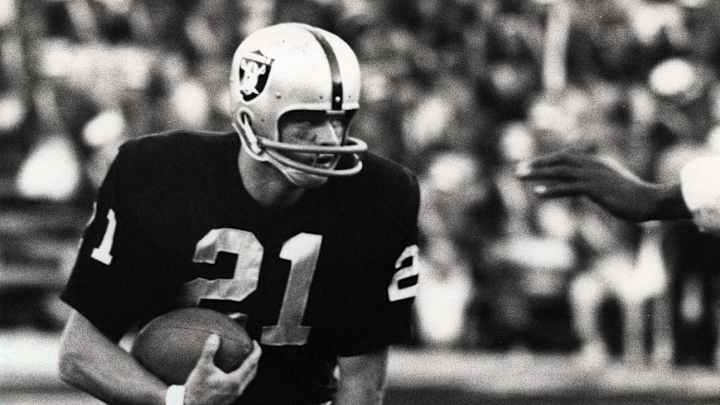Raiders Rodger Bird's Career Wasn't Long, But Impactful

Safety Rodger Bird might have become one of the greatest Las Vegas-Oakland-Los Angeles Raiders had he not been forced to retire after three seasons following two shoulder surgeries.
The six-foot, 200-pound Bird was selected by the Raiders in the seventh round (No. 63 overall) of the 1966 National Football League draft out of Kentucky, where he had been a two--way starter, rushing for 1,699 yards and 21 touchdowns in his career, being selected All-Southeastern Conference in his last two seasons and All-American as a senior.
When he came to the Raiders, Bird became a starter as a rookie and showed off his versatility as a kickoff and punt returner.
“Rodger Bird could do so many things well,” Raiders Hall of Fame cornerback Willie Brown recalled. “Not only was he very good in the secondary right away as a rookie, but he could also give us good field position on kick returns.
“When we were on the field together, I always felt confident in him without even having to look for where he was. I knew he always had my back. It’s a shame his career ended so soon.”
While he was with the Raiders, Bird helped the Raiders go 13-1 during the 1967 season and rout the Houston Oilers, 40-7, in the American Football Conference Championship Game before losing to the Green Bay Packers, 33-14, in Super Bowl II.
Unfortunately, Bird is remembered mainly for his miscue in the latter game.
The Packers had a 13-7 lead late in the first half, but the Raiders had just scored their first touchdown on Daryle Lamonica’s 23-yard pass to wide receiver Bill Miller when the Silver and Black held Green Bay to one yard on the following three plays.
However, Bird fumbled the ensuing punt inside the 50-yard line, and the Packers recovered on the Oakland 47 to set up Don Chandler’s 43-yard field goal with seconds left in the half. Green Bay scored on Donny Anderson’s two-yard run on the first possession of the second half and built an insurmountable 33-7 lead in legendary Vince Lombardi’s final game as head coach of the pack.
Bird didn’t let it get him down.
“We were the young boys on the block, and they were the veterans,” said Bird, who was 1966 AFL Defensive Rookie of the Year and second-team All-AFL safety his last two seasons. “We played a good team, and we just got beat.
“We had traded to get some great players who fit in, like Willie Brown, Daryle Lamonica, and George Blanda. We had some players who were getting ready to blossom, like Gene Upshaw and Fred Biletnikoff. Those additions really built a pretty good football team.
“If you are going to be a championship team, you’re going to have to have defense. You can score all day, but you had better stop them, and we didn’t neglect the defense. We had good players, good coaching and good support out there. We were a tight-knit group.”
Unfortunately, Bird wouldn’t be part of it, having to hang up his cleats after the 1968 season.
For the umpteenth time, we don’t know how many tackles Bird made because they were unofficial statistics at the time. Still, in three seasons as part of the defense named “The Eleven Angry Men,” Bird made 12 interceptions that he returned for 110 yards in 38 games, including a 23-yard touchdown return in 1968.
Bird also returned 94 punts for 1,063 yards, including a 78-yarder, and 25 kickoffs for 533 yards.
In the ensuing years, Bird often reunited with some former teammates, including at Managing General Partner Al Davis’ induction to the Pro Football Hall of Fame in Canton, Ohio 1992.
Bird, elected to the Kentucky Athletic Hall of Fame in 2005, passed away on May 16, 2020, at his home in Henderson, Ky., at 76. The cause of death was not announced.
Please tell us your thoughts when you like our Facebook Page WHEN YOU CLICK RIGHT HERE.
